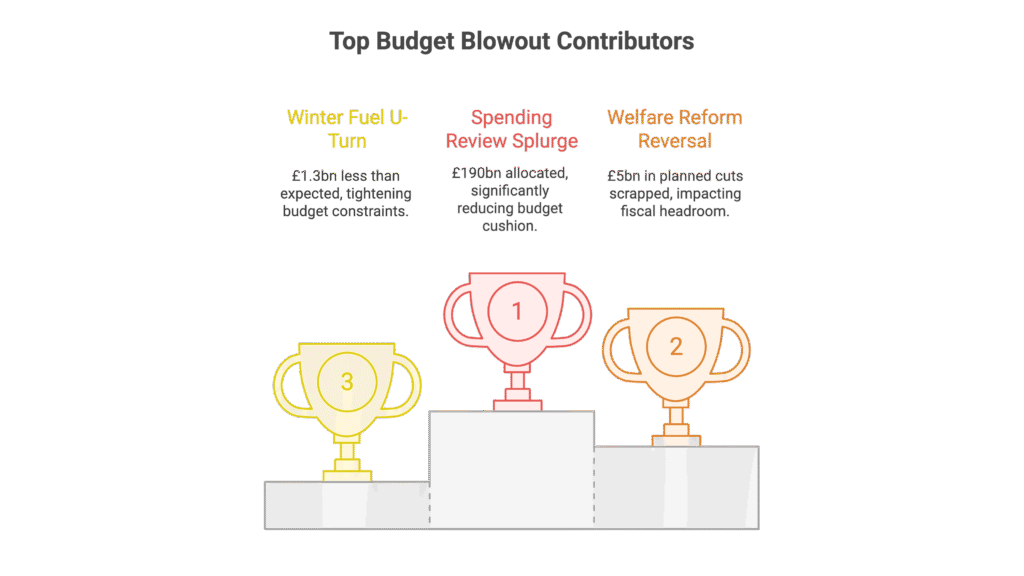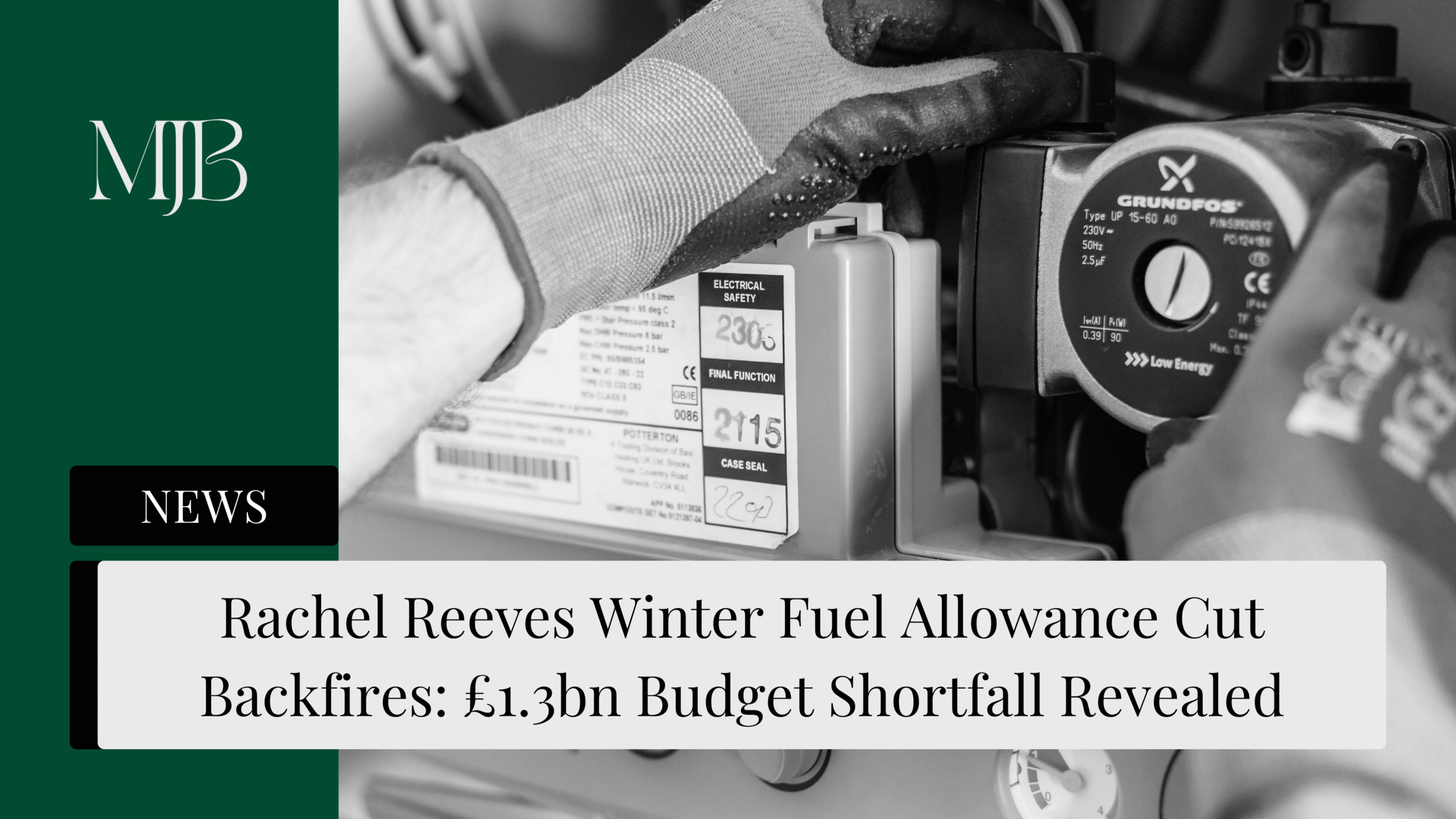Rachel Reeves’ probably thought the winter fuel allowance cuts seemed like easy money. Well, the Chancellor just learned why “easy” and “government policy” don’t mix.
Rachel Reeves’ winter fuel allowance raid has backfired spectacularly, raising £1.3bn less than planned after Labour’s embarrassing U-turn. What was supposed to save £1.5bn will now scrape together just £227m – that’s roughly the price of a couple of decent Premier League strikers. Not exactly the fiscal win Reeves was banking on for her autumn budget preparations.
Here’s how Rachel Reeves’ simple cost-cutting measure turned into a Treasury headache, and what it means for the Chancellor’s upcoming fiscal challenges.
Why Rachel Reeves’ Winter Fuel Savings Disappeared
Originally targeting £1.5bn in savings, the policy now delivers a measly £227m – a shortfall that would make any CFO wince.
Two main culprits killed the savings:
The Backbench Rebellion: Labour MPs forced a U-turn that restored winter fuel payments to many pensioners. Nothing kills a money-saving scheme quite like your own party voting against it.
The Pension Credit Surge: The kicker – 181,100 retirees claimed pension credit last year, up 57,200 from the previous year. Since pension credit claimants automatically qualify for winter fuel allowance, each new claimant directly cuts into the Treasury’s projected savings.
Sir Steve Webb from LCP put it: “This surge in claims has put a further dent in the revenue from this ill-fated policy.”.

Rachel Reeves Budget 2025: Facing a £50bn Fiscal Black Hole
The winter fuel fiasco isn’t happening in isolation. Reeves is staring down what economists are calling a £50bn black hole – and that’s before accounting for her latest policy reversals.
The Budget Blowout Breakdown
The Chancellor’s fiscal headroom is evaporating faster than morning frost:
- Winter fuel U-turn: £1.3bn less than expected
- Welfare reform reversal: £5bn in planned cuts scrapped
- Spending Review splurge: £190bn allocated, eating into the budget cushion
These setbacks have demolished the “wafer-thin fiscal headroom” Reeves carefully preserved at March’s Spring Statement. The National Institute for Social and Economic Research suggests she might need to raise taxes by £50bn to balance the books.

What’s Next for Rachel Reeves’ Autumn Budget Strategy
With the Autumn Budget 2025 approaching, all eyes are on how Rachel Reeves will plug these gaps. Enter Torsten Bell, the pensions minister who’s reportedly taking on expanded economic policy responsibilities.
Bell’s promotion from backbencher to key Budget architect in just seven months signals Labour’s scramble to find fresh solutions. Whether he can help Rachel Reeves navigate out of this fiscal maze remains the £50bn question ahead of the autumn budget.
Key Takeaways
Rachel Reeves learned an expensive lesson: in politics, even “simple” cost-cutting measures can explode in your face. The winter fuel allowance debacle showcases how policy U-turns and demographic shifts can obliterate Treasury projections.
With a potential £50bn shortfall looming, Rachel Reeves needs to find new revenue streams fast. The Autumn Budget 2025 will reveal whether Labour can balance fiscal responsibility with political reality – or if more policy reversals await the Chancellor.
FAQ
Q1: How much will the winter fuel allowance cuts actually save now?
A: Just £227m, down from the original £1.5bn target. The combination of political U-turns and rising pension credit claims destroyed most projected savings.
Q2: Why did pension credit claims surge so dramatically?
A: An additional 57,200 pensioners claimed pension credit last year, likely due to increased awareness and outreach. Since these claimants automatically qualify for winter fuel payments, each new claim reduces Treasury savings.
Q3: What does this mean for Rachel Reeves’ Autumn Budget 2024?
A: Rachel Reeves faces a much tighter fiscal situation with potentially £50bn in tax rises needed. The winter fuel shortfall adds pressure to find alternative revenue sources or spending cuts in the autumn budget.
Q4: Who is Torsten Bell and why does his role matter?
A: Bell is the pensions minister taking on expanded economic policy responsibilities for Budget preparations. His rapid rise from backbencher to key economic advisor suggests Labour is reshuffling its fiscal strategy team.
Q5: Could Labour reverse more policies before the Budget?
A: With mounting pressure from MPs and tight fiscal constraints, additional policy reversals remain possible. The party is clearly struggling to balance political promises with economic realities.
DISCLAIMER
Effective Date: 15th July 2025
The information provided on this website is for informational and educational purposes only and reflects the personal opinions of the author(s). It is not intended as financial, investment, tax, or legal advice.
We are not certified financial advisers. None of the content on this website constitutes a recommendation to buy, sell, or hold any financial product, asset, or service. You should not rely on any information provided here to make financial decisions.
We strongly recommend that you:
- Conduct your own research and due diligence
- Consult with a qualified financial adviser or professional before making any investment or financial decisions
While we strive to ensure that all information is accurate and up to date, we make no guarantees about the completeness, reliability, or suitability of any content on this site.
By using this website, you acknowledge and agree that we are not responsible for any financial loss, damage, or decisions made based on the content presented.






